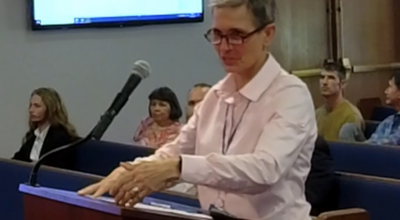Turner/Tennant Foundation gives big lift to Virtual Early College
Published 7:47 pm Wednesday, August 12, 2009
In 2007, the school system received about $1.3 million to cover operational costs during the first five years of the school, which was created through a partnership with UNC-Greensboro.
At Polk County&squo;s school board meeting Monday, Supt. Miller expressed gratitude that the school system no longer has to worry about funding the top position at the early college.
&dquo;It&squo;s a wonderful, wonderful thing,&dquo; said Supt. Miller, &dquo;and we are very thankful to Mr. Tennant and Mrs. Turner. I know she would be very happy with this given her love for education.&dquo;
In recognition of the contribution and the memory of former Polk teacher Ann Turner, Polk County Schools will name the director position the Ann L. Turner Directorship.
Tennant, the son of Turner and the current chair of the Polk school board, said his foundation&squo;s board decided to begin the contribution this year even though funds for the director position will not run out for another two years.
The Polk school board accepted the $40,000 contribution on Monday for the upcoming school year.
Tennant noted that the funds can be used this year to cover other needs and benefit students at a time when the recession has significantly cut state education revenue. The same will be true next year, he said.
The school board chairman said his foundation decided that supporting the early college&squo;s director position was perhaps the best use of funds, especially considering the time limit on funding for the position.
&dquo;It would be very difficult, given the nature of things now, for us to pick up that (funding in two years),&dquo; said Tennant. &dquo;Our board of directors in June agreed to make the first annual contribution and make it an annual thing, and we are very happy to be able to do it.&dquo;
Tennant says the Virtual Early College provides a valuable alternative for students who may not learn as well as others in the traditional classroom setting. The college, formed in 2007, gives students a chance to pursue an online-based course of study and receive up to 60 hours of college credit at no cost.
Students at the early college, located in the former Polk County main library building on Walker Street in Columbus, schedule their time to complete assignments and tests in online classes taken by students across the state and country. The students use online resources and communication with teachers, assistants and former students to learn the material, which is available to them at any time of the day or night.
As a freshman they can begin working out a plan of study that allows them to attain early the credits they need for high school graduation and also begin accumulating the free college credits. They can also continue in the program for an extra year to reach up to 60 college credits.
Polk County&squo;s Virtual Early College started with about 20 students in 2007 and increased to about 32 last year.
The school district has forecasted a steady increase until reaching about 125&bsp; students by the 2011-2012 year.
&dquo;This is a great program that serves a niche population,&dquo; says Tennant. &dquo;For the kids that are there, this is where they are comfortable. People learn in different ways and you have to find ways to engage all of the students and help them stay in school and move toward graduation.&dquo;
The state&squo;s New Schools Project, which led to the creation of the early college, was started to help reduce the dropout rate.
The project was an initiative launched by former N.C. Governor Mike Easley and the N.C. Education Cabinet with the support of the Bill & Melinda Gates Foundation.





